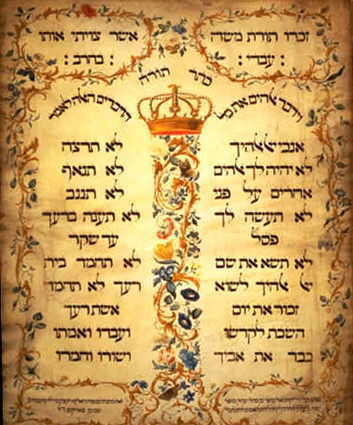

Within Christianity, the Decalogue has traditionally been regarded as the foundational laws that all Christians are to conform to. Most Christians continue to hold them in high regard, even though they have rejected most of the other laws in the Mosaic Code as no longer applicable or binding.
Exodus tells us:
Exodus 19
Moses on Sinai
1In the third month after the sons of Israel had gone out of the land of Egypt, on that very day they came into the wilderness of Sinai. 2When they set out from Rephidim, they came to the wilderness of Sinai and camped in the wilderness; and there Israel camped in front of the mountain. 3Moses went up to God, and the LORD called to him from the mountain, saying, “Thus you shall say to the house of Jacob and tell the sons of Israel: 4‘You yourselves have seen what I did to the Egyptians, and how I bore you on eagles’ wings, and brought you to Myself. 5‘Now then, if you will indeed obey My voice and keep My covenant, then you shall be My own possession among all the peoples, for all the earth is Mine; 6and you shall be to Me a kingdom of priests and a holy nation.’ These are the words that you shall speak to the sons of Israel.”
7So Moses came and called the elders of the people, and set before them all these words which the LORD had commanded him. 8All the people answered together and said, “All that the LORD has spoken we will do!” And Moses brought back the words of the people to the LORD. 9The LORD said to Moses, “Behold, I will come to you in a thick cloud, so that the people may hear when I speak with you and may also believe in you forever.” Then Moses told the words of the people to the LORD.
10The LORD also said to Moses, “Go to the people and consecrate them today and tomorrow, and let them wash their garments; 11and let them be ready for the third day, for on the third day the LORD will come down on Mount Sinai in the sight of all the people. 12“You shall set bounds for the people all around, saying, ‘Beware that you do not go up on the mountain or touch the border of it; whoever touches the mountain shall surely be put to death. 13‘No hand shall touch him, but he shall surely be stoned or shot through; whether beast or man, he shall not live.’ When the ram’s horn sounds a long blast, they shall come up to the mountain.” 14So Moses went down from the mountain to the people and consecrated the people, and they washed their garments. 15He said to the people, “Be ready for the third day; do not go near a woman.”
16So it came about on the third day, when it was morning, that there were thunder and lightning flashes and a thick cloud upon the mountain and a very loud trumpet sound, so that all the people who were in the camp trembled. 17And Moses brought the people out of the camp to meet God, and they stood at the foot of the mountain.
The Lord Visits Sinai
18Now Mount Sinai was all in smoke because the LORD descended upon it in fire; and its smoke ascended like the smoke of a furnace, and the whole mountain quaked violently. 19When the sound of the trumpet grew louder and louder, Moses spoke and God answered him with thunder. 20The LORD came down on Mount Sinai, to the top of the mountain; and the LORD called Moses to the top of the mountain, and Moses went up. 21Then the LORD spoke to Moses, “Go down, warn the people, so that they do not break through to the LORD to gaze, and many of them perish. 22“Also let the priests who come near to the LORD consecrate themselves, or else the LORD will break out against them.” 23Moses said to the LORD, “The people cannot come up to Mount Sinai, for You warned us, saying, ‘Set bounds about the mountain and consecrate it.’” 24Then the LORD said to him, “Go down and come up again, you and Aaron with you; but do not let the priests and the people break through to come up to the LORD, or He will break forth upon them.” 25So Moses went down to the people and told them.
Exodus 20
The Ten Commandments
1Then God spoke all these words, saying,
2“I am the LORD your God, who brought you out of the land of Egypt, out of the house of slavery.
3“You shall have no other gods before Me.
4“You shall not make for yourself an idol, or any likeness of what is in heaven above or on the earth beneath or in the water under the earth. Exodus 20
The Ten Commandments
1Then God spoke all these words, saying,
2“I am the LORD your God, who brought you out of the land of Egypt, out of the house of slavery.
3“You shall have no other gods before Me.
4“You shall not make for yourself an idol, or any likeness of what is in heaven above or on the earth beneath or in the water under the earth. 5“You shall not worship them or serve them; for I, the LORD your God, am a jealous God, visiting the iniquity of the fathers on the children, on the third and the fourth generations of those who hate Me, 6but showing lovingkindness to thousands, to those who love Me and keep My commandments.
7“You shall not take the name of the LORD your God in vain, for the LORD will not leave him unpunished who takes His name in vain.
8“Remember the sabbath day, to keep it holy. 9“Six days you shall labor and do all your work, 10but the seventh day is a sabbath of the LORD your God; in it you shall not do any work, you or your son or your daughter, your male or your female servant or your cattle or your sojourner who stays with you. 11“For in six days the LORD made the heavens and the earth, the sea and all that is in them, and rested on the seventh day; therefore the LORD blessed the sabbath day and made it holy.
12“Honor your father and your mother, that your days may be prolonged in the land which the LORD your God gives you.
13“You shall not murder.
14“You shall not commit adultery.
15“You shall not steal.
16“You shall not bear false witness against your neighbor.
17“You shall not covet your neighbor’s house; you shall not covet your neighbor’s wife or his male servant or his female servant or his ox or his donkey or anything that belongs to your neighbor.”
18All the people perceived the thunder and the lightning flashes and the sound of the trumpet and the mountain smoking; and when the people saw it, they trembled and stood at a distance. 19Then they said to Moses, “Speak to us yourself and we will listen; but let not God speak to us, or we will die.” 20Moses said to the people, “Do not be afraid; for God has come in order to test you, and in order that the fear of Him may remain with you, so that you may not sin.” 21So the people stood at a distance, while Moses approached the thick cloud where God was.
22Then the LORD said to Moses, “Thus you shall say to the sons of Israel, ‘You yourselves have seen that I have spoken to you from heaven. 23‘You shall not make other gods besides Me; gods of silver or gods of gold, you shall not make for yourselves. 24‘You shall make an altar of earth for Me, and you shall sacrifice on it your burnt offerings and your peace offerings, your sheep and your oxen; in every place where I cause My name to be remembered, I will come to you and bless you. 25‘If you make an altar of stone for Me, you shall not build it of cut stones, for if you wield your tool on it, you will profane it. 26‘And you shall not go up by steps to My altar, so that your nakedness will not be exposed on it.’ Exodus 20
The Ten Commandments
1Then God spoke all these words, saying,
2“I am the LORD your God, who brought you out of the land of Egypt, out of the house of slavery.
3“You shall have no other gods before Me.
4“You shall not make for yourself an idol, or any likeness of what is in heaven above or on the earth beneath or in the water under the earth. 5“You shall not worship them or serve them; for I, the LORD your God, am a jealous God, visiting the iniquity of the fathers on the children, on the third and the fourth generations of those who hate Me, 6but showing lovingkindness to thousands, to those who love Me and keep My commandments.
7“You shall not take the name of the LORD your God in vain, for the LORD will not leave him unpunished who takes His name in vain.
8“Remember the sabbath day, to keep it holy. 9“Six days you shall labor and do all your work, 10but the seventh day is a sabbath of the LORD your God; in it you shall not do any work, you or your son or your daughter, your male or your female servant or your cattle or your sojourner who stays with you. 11“For in six days the LORD made the heavens and the earth, the sea and all that is in them, and rested on the seventh day; therefore the LORD blessed the sabbath day and made it holy.
12“Honor your father and your mother, that your days may be prolonged in the land which the LORD your God gives you.
13“You shall not murder.
14“You shall not commit adultery.
15“You shall not steal.
16“You shall not bear false witness against your neighbor.
17“You shall not covet your neighbor’s house; you shall not covet your neighbor’s wife or his male servant or his female servant or his ox or his donkey or anything that belongs to your neighbor.”
18All the people perceived the thunder and the lightning flashes and the sound of the trumpet and the mountain smoking; and when the people saw it, they trembled and stood at a distance. 19Then they said to Moses, “Speak to us yourself and we will listen; but let not God speak to us, or we will die.” 20Moses said to the people, “Do not be afraid; for God has come in order to test you, and in order that the fear of Him may remain with you, so that you may not sin.” 21So the people stood at a distance, while Moses approached the thick cloud where God was.
22Then the LORD said to Moses, “Thus you shall say to the sons of Israel, ‘You yourselves have seen that I have spoken to you from heaven. 23‘You shall not make other gods besides Me; gods of silver or gods of gold, you shall not make for yourselves. 24‘You shall make an altar of earth for Me, and you shall sacrifice on it your burnt offerings and your peace offerings, your sheep and your oxen; in every place where I cause My name to be remembered, I will come to you and bless you. 25‘If you make an altar of stone for Me, you shall not build it of cut stones, for if you wield your tool on it, you will profane it. 26‘And you shall not go up by steps to My altar, so that your nakedness will not be exposed on it.’ Exodus 20
The Ten Commandments
1Then God spoke all these words, saying,
2“I am the LORD your God, who brought you out of the land of Egypt, out of the house of slavery.
3“You shall have no other gods before Me.
4“You shall not make for yourself an idol, or any likeness of what is in heaven above or on the earth beneath or in the water under the earth. 5“You shall not worship them or serve them; for I, the LORD your God, am a jealous God, visiting the iniquity of the fathers on the children, on the third and the fourth generations of those who hate Me, 6but showing lovingkindness to thousands, to those who love Me and keep My commandments.
7“You shall not take the name of the LORD your God in vain, for the LORD will not leave him unpunished who takes His name in vain.
8“Remember the sabbath day, to keep it holy. 9“Six days you shall labor and do all your work, 10but the seventh day is a sabbath of the LORD your God; in it you shall not do any work, you or your son or your daughter, your male or your female servant or your cattle or your sojourner who stays with you. 11“For in six days the LORD made the heavens and the earth, the sea and all that is in them, and rested on the seventh day; therefore the LORD blessed the sabbath day and made it holy.
12“Honor your father and your mother, that your days may be prolonged in the land which the LORD your God gives you.
13“You shall not murder.
14“You shall not commit adultery.
15“You shall not steal.
16“You shall not bear false witness against your neighbor.
17“You shall not covet your neighbor’s house; you shall not covet your neighbor’s wife or his male servant or his female servant or his ox or his donkey or anything that belongs to your neighbor.”
18All the people perceived the thunder and the lightning flashes and the sound of the trumpet and the mountain smoking; and when the people saw it, they trembled and stood at a distance. 19Then they said to Moses, “Speak to us yourself and we will listen; but let not God speak to us, or we will die.” 20Moses said to the people, “Do not be afraid; for God has come in order to test you, and in order that the fear of Him may remain with you, so that you may not sin.” 21So the people stood at a distance, while Moses approached the thick cloud where God was.
22Then the LORD said to Moses, “Thus you shall say to the sons of Israel, ‘You yourselves have seen that I have spoken to you from heaven. 23‘You shall not make other gods besides Me; gods of silver or gods of gold, you shall not make for yourselves. 24‘You shall make an altar of earth for Me, and you shall sacrifice on it your burnt offerings and your peace offerings, your sheep and your oxen; in every place where I cause My name to be remembered, I will come to you and bless you. 25‘If you make an altar of stone for Me, you shall not build it of cut stones, for if you wield your tool on it, you will profane it. 26‘And you shall not go up by steps to My altar, so that your nakedness will not be exposed on it.’ 5“You shall not worship them or serve them; for I, the LORD your God, am a jealous God, visiting the iniquity of the fathers on the children, on the third and the fourth generations of those who hate Me, 6but showing lovingkindness to thousands, to those who love Me and keep My commandments.
7“You shall not take the name of the LORD your God in vain, for the LORD will not leave him unpunished who takes His name in vain.
8“Remember the sabbath day, to keep it holy. 9“Six days you shall labor and do all your work, 10but the seventh day is a sabbath of the LORD your God; in it you shall not do any work, you or your son or your daughter, your male or your female servant or your cattle or your sojourner who stays with you. 11“For in six days the LORD made the heavens and the earth, the sea and all that is in them, and rested on the seventh day; therefore the LORD blessed the sabbath day and made it holy.
12“Honor your father and your mother, that your days may be prolonged in the land which the LORD your God gives you.
13“You shall not murder.
14“You shall not commit adultery.
15“You shall not steal.
16“You shall not bear false witness against your neighbor.
17“You shall not covet your neighbor’s house; you shall not covet your neighbor’s wife or his male servant or his female servant or his ox or his donkey or anything that belongs to your neighbor.”
18All the people perceived the thunder and the lightning flashes and the sound of the trumpet and the mountain smoking; and when the people saw it, they trembled and stood at a distance. 19Then they said to Moses, “Speak to us yourself and we will listen; but let not God speak to us, or we will die.” 20Moses said to the people, “Do not be afraid; for God has come in order to test you, and in order that the fear of Him may remain with you, so that you may not sin.” 21So the people stood at a distance, while Moses approached the thick cloud where God was.
22Then the LORD said to Moses, “Thus you shall say to the sons of Israel, ‘You yourselves have seen that I have spoken to you from heaven. 23‘You shall not make other gods besides Me; gods of silver or gods of gold, you shall not make for yourselves. 24‘You shall make an altar of earth for Me, and you shall sacrifice on it your burnt offerings and your peace offerings, your sheep and your oxen; in every place where I cause My name to be remembered, I will come to you and bless you. 25‘If you make an altar of stone for Me, you shall not build it of cut stones, for if you wield your tool on it, you will profane it. 26‘And you shall not go up by steps to My altar, so that your nakedness will not be exposed on it.’
Exodus 34:27-28
Exodus 34:9-34
Within Islam, the religion's holy book -- the Qur'an -- appears to refer to the Decalogue and to urge that they be followed; however it does not contain the actual text:
007.145 "And We ordained laws for him in the tablets in all matters, both commanding and explaining all things, (and said): 'Take and hold these with firmness, and enjoin thy people to hold fast by the best in the precepts'..."
The term "Decalogue" or "Decalog" is derived from the Middle English "decaloge" which comes from the Latin "decalogus," which in turn originates from the Greek "dekalogus." "Deka" in Greek means "ten".
The Ten Commandments are a brief summary of certain basic rules of behavior. They do not specifically address some of the most active of today's moral controversies, such as abortion, corporal punishment of children, the death penalty, equal rights for homosexuals, same-sex marriage, physician assisted suicide, pre-marital sex, etc.
There are three versions of the Decalogue mentioned in the Hebrew Scriptures (a.k.a. Old Testament). All are different. They are at Exodus 20:2-17, Exodus 34:12-26, and Deuteronomy 5:6-21. The version in Exodus 20 is by far the most commonly cited.
Depending upon how Ten Commandments are interpreted, the Exodus 20 version contain a total of 19 to 25 separate instructions. These have been traditionally sorted into ten groups. Unfortunately, various faith groups sort them differently. This makes inter-faith dialog very difficult at times, and can cause conflicts over which version of the Decalogue is to be displayed.
Although the Ten Commandments are held in high respect by many Christians, two of them are routinely broken by some Christian denominations -- at least if they are interpreted literally:
The prohibition against "any graven image, or any likeness of any thing...," if interpreted literally, would seem to forbid a wide range of objects, including a statue in a church, a cross, a crucifix, or even to a photograph of a person. However, many denominations do not interpret this passage in isolation or do not interpret it literally. This allows Eastern Orthodox churches to display icons, Roman Catholic churches to contains statues, and many Protestant churches to contain drawings and/or photographs.
Reserving the Sabbath (Saturday) as a day of rest. The vast majority of churches have their main services on Sunday. Only Sabbaterian denominations, like the Seventh Day Adventists and Seventh Day Baptists, follow celebrate on Saturday.
Should everyone follow the Ten Commandments:
The U.S. is the most religiously diverse country in the world. Southern Ontario in Canada is regarded as the most religiously diverse region of any country in the world. Both nations share a legacy of religious freedom and religious tolerance. The U.S. Supreme Court has interpreted the Constitution as requiring a complete separation of church and state. Canadian culture largely separates church and state by tradition. However, the Ten Commandments were created within an entirely different culture with very different expectations of its citizens. It was a theocracy where church and state were blended. Everyone was expected to follow the state religion. A person following a different religion or proselytizing a different faith could find themselves sentenced to death.
This culture clash has produced criticisms of some commandments within the Decalogue:
The first commandment requires that no god other than Yahweh is to be worshipped. This is in open conflict with the "first freedom" in the U.S. and Canada -- religious freedom.
The second commandment, interpreted literally, punishes a man's children, grandchildren, great-grandchildren and perhaps even great-great grandchildren if the man has sinned by serving other Gods. Spreading the responsibility for one person's sin onto innocent descendents was common in the ancient Middle East. However, most contemporary ethical systems -- both secular and religious -- hold a person responsible only for their own actions. Punishing innocent children widely considered a seriously immoral act.
The fifth commandment requires that children honor their parents. Many would feel that it is unreasonable to expect a child to honor a parent who was a sexual molester, a physical abuser or was guilty of neglect.
There are two problems associated with the tenth commandment: It treats women as pieces of property. It condones slavery. The terms "manservant" and "maidservant" in the King James Version of the Bible refer to male and female slaves.
Equal treatment for men and women form an integral part of many religious groups' beliefs. Almost all North American religious groups reject the concept of owning another human being in a state of slavery.
What the public believes about the Ten Commandments:
There is a gap between what the Ten Commandments actually state, and what the public perceives that they say. Most people incorrectly believe that all of the Commandments govern moral behavior in society: to not lie, steal, commit adultery, etc. In reality, the first four commandments are religious in nature, uniquely related to Judaism, Christianity and Islam. They are offensive to the followers of many other religions. Only the last six relate to moral behavior in society.
A widely believed misunderstanding is that the entire Decalogue forms the foundation for the North American legal system. The statement by Sonny Crawford and Pat Lazenby, grand presidents of the Order of Eagles is typical. The Eagles is the service group that sponsored the installations of hundreds of monuments containing the text of the Decalogue across the U.S. They wrote in a joint statement: "The Fraternal Order of Eagles has promoted the Ten Commandments not in an attempt to impose religion on the masses, but rather in recognition of their role in the very foundation of our legal system...Our very laws are built on the bedrock moral precepts of the Ten Commandments." This is only partly true. The first half of the Ten Commandments are a series of commands about the recognition of God. It is only the second half that deal with actual behavior towards other humans. The latter are common to almost all religious systems and are seen in many religious and secular law codes -- some of which preceded the Ten Commandments. Law codes in the U.S. and the rest of the western world are derived from a variety of sources, including the Ten Commandments and Pagan Roman laws.
Some North Americans feel that everyone should follow all of the Ten Commandments, whether they be Buddhist, Christian, Hindu, Jewish, Muslim, Wiccan, etc. They push for the Decalog to be posted in schools, court houses, publicly owned parks, etc. where people will get the impression that the governments and school boards promote Judeo-Christianity.
Others feel that posting the Decalogue can generate religious conflict, and make some of the public feel like second-class citizens. Some feminists, civil libertarians and others find portions of the Ten Commandments repulsive. They favor restricting the Decalogue to religious and other private property.
Legal battles about displaying the Ten Commandments:
Governments in the U.S., including public school boards, are required to remain neutral on religious matters. This means that:
They cannot promote one religion over another.
During the 1950s and 1960s, the Fraternal Order of Eagles erected as many as 4,000 markers, statues, and monuments featuring the Ten Commandments in public parks, government buildings, etc. Some were involved in the promotion of the 1956 film, The Ten Commandments, and were dedicated with Charlton Heston and Yul Brynner present. They played Moses and the unnamed Egyptian Pharaoh in the movie.
There were occasional lawsuits filed prior to 2002 to force the removal of these monuments. In 2001. the U.S. Supreme Court let stand a lower court order that a Ten Commandments monument in Elkhart, IN, be removed. It has since refused to hear similar cases. Conflict escalated in 2002-NOV, when U.S. District Judge Myron Thompson ruled that the presence of Chief Justice Moore's Ten Commandments monument in the Alabama state courts building "constitutes government endorsement of religion." He ordered that it be removed. Since then, dozens of lawsuits have been launched across the U.S. Many have been launched by branches of the American Civil Liberties Union in different states, and by Americans United for Separation of Church and State.
USA Today reported:
"Monument opponents say that America's increased [religious] diversity accounts for many of the lawsuits. 'The religious motivation (of the monuments) was not as obvious when there weren't as many religious minorities or people with no religion,' says the Rev. Barry Lynn, director of Americans United for Separation of Church and State.' The lawsuits are occurring 'because [opponents] now feel they have a shot at winning. But the cases are a declaration that [the monuments are] important, too'.'"
"The case Wednesday [2004-SEP-15] by a federal appeals court in St. Louis reflects the issues in many of the disputes. On one side, John Doe, an unidentified atheist and ACLU member in rural Nebraska, said the Ten Commandments monument in a park in the town of Plattsmouth 'alienates' him and makes him feel like a 'second-class citizen,' according to court papers. The monument -- a 5-foot granite slab presented by the Eagles in 1965 -- amounts to 'Judeo-Christian' religious instruction, Doe argues. Doe, who filed suit anonymously to try to avoid a backlash in the town of 6,800, has won in a lower court."The Ten Commandments (a.k.a. Decalog) are a listing of some of the most important behavioral rules in the Hebrew Scriptures (a.k.a. Old Testament).
Within Judaism, they have historically been accepted as a summary of the most important ten rules of behavior which God expects all Jews to follow. The Torah records that God gave the Decalogue to Moses on Mount Sinai, inscribed on stone tablets, and intended for the guidance of the ancient Hebrews. They form a small but vital part of the total of 623 laws in the Hebrew Scriptures.
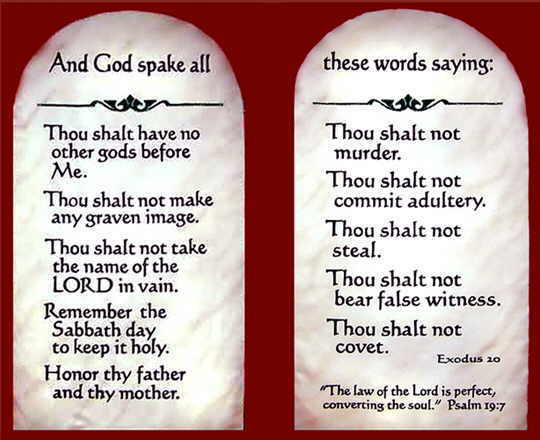
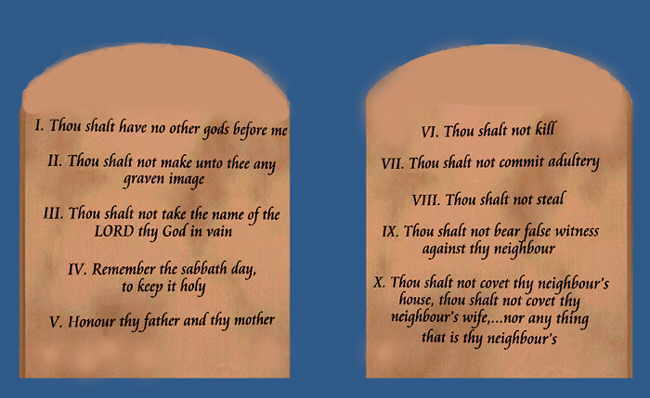
Then the LORD said to Moses, “Write down these words, for in accordance with these words I have made a covenant with you and with Israel.” 28Moses was there with the LORD forty days and forty nights without eating bread or drinking water. And he wrote on the tablets the words of the covenant—the Ten Commandments.
When Moses came down from Mount Sinai with the two tablets of the Testimony in his hands, he was not aware that his face was radiant because he had spoken with the LORD. 30When Aaron and all the Israelites saw Moses, his face was radiant, and they were afraid to come near him. 31But Moses called to them; so Aaron and all the leaders of the community came back to him, and he spoke to them. 32Afterward all the Israelites came near him, and he gave them all the commands the LORD had given him on Mount Sinai.
33When Moses finished speaking to them, he put a veil over his face. 34But whenever he entered the LORD’S presence to speak with him, he removed the veil until he came out. And when he came out and told the Israelites what he had been commanded, 35they saw that his face was radiant. Then Moses would put the veil back over his face until he went in to speak with the LORD.
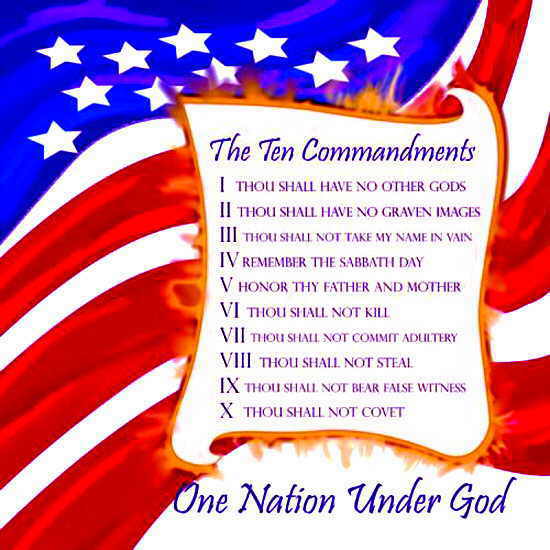
Do Christians follow the Ten Commandments?
They cannot promote a religious lifestyle over a secular one.
They cannot promote a secular lifestyle over a religious one.
Posting the Ten Commandments clearly promotes the main Abrahamic religions -- Judaism, Christianity and Islam. By requiring religious services on Saturday and threatening people if they do not worship Yahweh, the Commandments denigrate the remaining world religions which are followed by about half of the human population. Thus, to be constitutional, the Ten Commandments cannot be posted in isolation. They can only be displayed along with other sets of religious laws in order to meet the first criteria. They must be accompanied with secular laws to meet the second criteria. That is, they would have to be part of a cultural display.
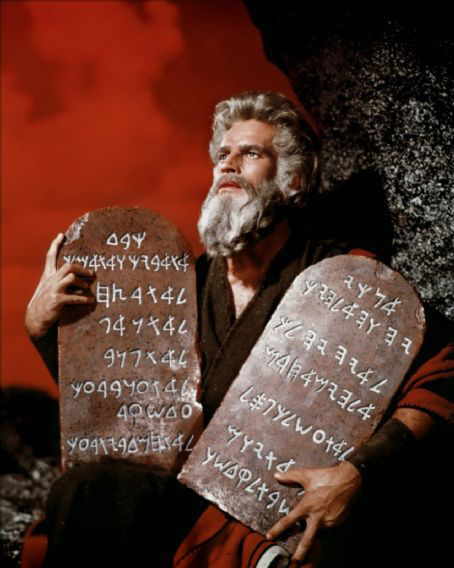
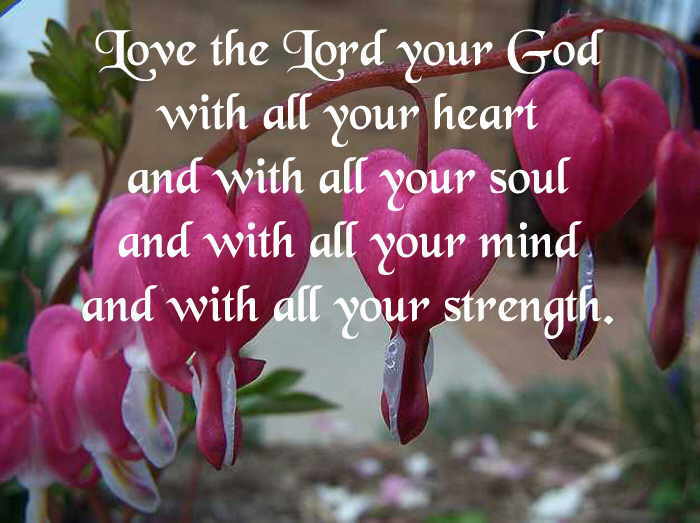
30 Love the Lord your God with all your heart and with
all your soul and with all your mind and with all your strength.’
31 The second is this: ‘Love your neighbor as yourself.’
There is no commandment greater than these.”